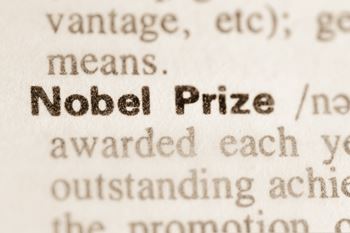We at Horizon Discovery could not miss the opportunity to congratulate the 2020 Chemistry Nobel Laureates, Jennifer Doudna and Emmanuelle Charpentier! It is an amazing achievement to be the first all-female pair of recipients for this prestigious award increasing the overall number of women recipients in the Chemistry category from 5 to 7 since the first award ceremony in 1901.
Given the proximity of Jennifer’s work at CU Boulder to our Colorado lab and overlapping discipline, our team is particularly inspired by this historic achievement. Specifically, our Boulder (legacy Dharmacon) R&D team has followed Jennifer Doudna’s publications and talks for many years. From RNA club at CU Boulder in the 1990’s, her x-ray crystallography of Dicer and other RNA components, through to her groundbreaking gene editing CRISPR work that has propelled Jennifer and Emmanuelle to widespread popularity. We interviewed several of the Boulder R&D team asking them to share some of their personal reactions after one of our great female scientist role models, Jennifer Doudna, received the Nobel Prize in Chemistry. Our panel participants included: Emily Anderson, Principal Scientist; Ashleigh Keller, R&D Scientist I; Maren Mayer Gross, Scientific Content Manager; Tiana Stastny, Bioinformatics Scientist I; and Sarah Dickerson, R&D Scientist II.
How have you been inspired by the work of Jennifer Doudna over the years?
EA - Wow, having trained in Biochemistry at CU Boulder a long time ago, I remember Jennifer coming back to visit her Post-Doc lab just after her newly-formed lab had published the collaborative structure of the P4-6 domain/Tetrahymena self-splicing intron. As a first-year graduate student seeing this work, I was hooked on structure and function of RNA and protein/RNA complexes (and kooky other nucleic acid oddities, like sequence-specific recognition of ssDNA). Being an RNA-focused kind of place, anyone who has studied in Boulder has followed her career for decades has been inspired by her in all areas she has worked on and contributed. Not just CRISPR, but catalytic RNAs as mentioned, RNA structure and function in general, RNA Interference… by the rigorous, multidisciplinary approach she has taken to all of these fields.
AK - I actually was first introduced to CRISPR technology in 2014 by watching a TED talk about it by Jennifer Doudna. Although I have since read many of her scientific papers, and work with CRISPR every day, what inspired me was her ability to explain the technology in a way that a layperson without a scientific background could comprehend and appreciate this technology. I feel that as a society there is a lack of scientific understanding, and therefore a lack of trust, that negatively impacts our society.
MG - The first time I heard Jennifer speak, was at the microRNA and Cancer Keystone Symposia in 2009. As a junior scientist, at the time, I was in awe of Jennifer’s presence on the podium and excited about her talk that included biochemical structures and mechanism. (And, seriously, her name is “Do U DNA”, how amazing is that?) From then on, I have always enjoyed her talks and would recommend her publications to others. From the legacy “Dharmacon” R&D perspective, it was exciting to follow her research from RNA/miRNA/lncRNA research to the forefront of the “CRISPR revolution” in 2012. I would say she has been and is a role model to our whole team, not just the women.

How do you feel about your career goals and options now that she has received this prestigious award?
EA - I guess my career goals, in essence, have been validated. I enjoy doing basic research, but also conducting it in an industry setting.
I can think about cutting-edge science and technology, but also work on applying it for both research tools and eventual translation into medicine and therapies. Jennifer is not only a consummate scientist, but a highly effective educator, ambassador to the public at large, and a genuinely good human being. The world needs great scientists and great ambassadors for science more than ever right now. Full stop.
TS - This achievement definitely makes the possibility of success for women in science more solidified. Now more than ever, our career goals and dreams are becoming more and more attainable, as women such as Jennifer Doudna continue to pave the way. It makes a huge difference to see women succeed and helps us visualize our own success!
SD - Doudna’s work has drawn a lot of extra attention to science in general. Perhaps this extra attention will lead to more funding, more resources, more job prospects for us all.
AK - I have a niece who wants to be a scientist when she grows up (at least, that’s what she wants to be today) and I love that there are more examples of women in science, and more importantly, women excelling in science. I hope this is just the first of many.
MG - Seeing the first science Nobel Prize given to just 2 women is really a breathtaking achievement. For my own career, I have since moved out of the lab, but held on to my love of science. I feel validated and am so hopeful for my two young daughters to have even more opportunities in the future!
What is the importance of this achievement for future women and minorities in the science?
EA - I mean, it’s huge. Women, minorities, people both young and old (like me!) can be inspired by the work done to date in the CRISPR field. It’s this next generation of scholars across the spectrum that will take the lead from Jennifer, Emmanuelle, and other pioneers to tackle some really important challenges like the treatment of cancer and diseases with strong genetic components. Not to mention infectious disease, as well as broader issues involving the climate and environment, agriculture, etc.
TS - This achievement is absolutely wonderful for the future of women and minorities in science. We can be more confident that we will be taken seriously and have opportunities to achieve our goals. I am more hopeful than ever for both our generation’s future, but also the future generation of women and minority scientists.
SD - Two brilliant women winning the chemistry Nobel Prize encourages children to follow their dreams, regardless of their gender, race, or personal convictions.
AK - I hope that being a woman or minority in science will no longer be surprising – this is just one more step in the right direction.
MG - This achievement and the wide publicity around it gives people of any age, race, or gender two more examples of success that will hopefully inspire them to persevere through adversity and attain their goals.
Clearly this is a large step forward for women and diversity in science and truly a historic moment for science enthusiasts around the world. Horizon embraces diversity and is happy to celebrate this moment. We look forward to celebrating future science achievements and hope our products and reagents can be part of the great discovery.
Are you excited about CRISPR and interested in gene editing technology? We have many resources to support your educational journey. Here are a few places to start.
- Watch our CRISPR editing video series
- Visit our CRISPR-Cas9 gene editing applications pages
- Check out our other gene editing blog articles
